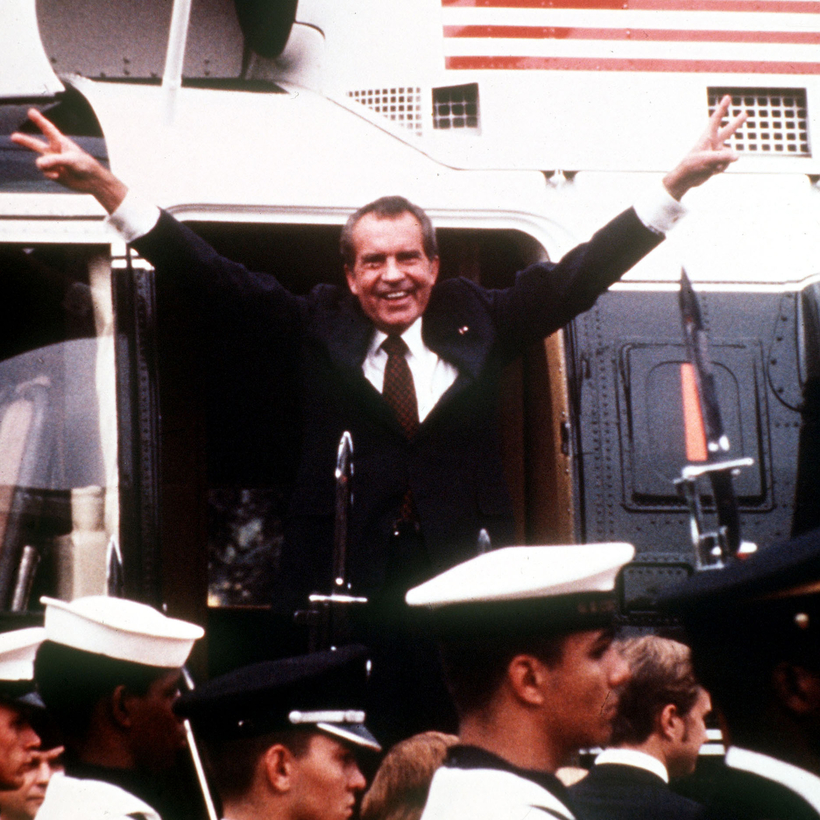You never forget your first impeachment crisis, and I remember mine like a lingering melody. It all began that sultry night of June 17, 1972, when a bungling team of burglars got nabbed red-handed breaking into the Democratic National Committee headquarters in the Watergate Hotel and office complex. It proved to be perhaps the most fateful act of numbskullery in our history. What was originally pooh-poohed by the White House as “a third-rate burglary” triggered a string of mousetraps that would eventually bring down the president.
The discovery of the Plumbers unit, the thuggish henchmen-ry of Charles Colson and G. Gordon Liddy, the two-headed growling Orthrus of Chief of Staff H. R. Haldeman and domestic adviser John Ehrlichman, the revelation of the White House taping system, the Saturday Night Massacre, the jowly profile of Nixonian authoritarianism casting a baleful shadow across the capital—to journalists and historians, the Watergate saga represents a dark, teetering chapter in our democracy, a dangerous brush with despotism.

And so it was. Yet, for me and many other cubbies of that time, Nixon’s impeachment-palooza will always carry a whiff of romance, the clatter of a thousand typewriters and the roar of newspaper presses creating an industrial symphony preserved in Steven Spielberg’s The Post. It was also theatrical, like an Allen Drury novel brought to life in distinct, digestible installments. It was possible to follow the Watergate story without throwing your biorhythms out of whack and to keep the latest chapter legible in your mind.
Lardy Evil vs. Scrupulous Good
Not so now. With the Trump-impeachment melodrama, an epic battle between lardy evil and scrupulous good, disequilibrium is the order of the day. News bulletins, flash updates, torrential tweetstorms, and mind-boggling sound bites flood the zone on an hourly, daily basis, producing a mental din—a persistent pandemonium bad for nerves, sleep, and morale. It’s hard to keep everything from spilling out of the mental frame and not feel that the struggle is all for naught.
Remedies, however, are available; sanity preservatives to offset the overload. Along with viewing The 11th Hour with Brian Williams on MSNBC, a model ship of steady calm, shrewd analysis, and urbane irony, I regularly attend to the Stay Tuned with Preet podcast (iTunes and elsewhere), which parses the latest legal and investigative maneuvers in the deep probe into the gurgling sewers of Trump criminality and grift, along with other burning topics of the day (Brexit, the opioid crisis, gun control). It benefits from intimate know-how of what it’s like working inside the boa constrictor of the legal system.
Fired by the Toadying Muffin
Preet is, of course, Preet Bharara, the former U.S. attorney for the Southern District of New York, a celebrated rooter-outer of corruption and reputedly one of the inspirations for Paul Giamatti’s hard-charging Charles “Chuck” Rhodes in Showtime’s Billions, though it’s difficult to picture Bharara being trussed and suspended in an S&M dungeon as Chuck is wont to do (undoubtedly an instance of artistic license slapping on the leather). Anyhoo, Bharara was fired after then attorney general Jeff Sessions asked for every remaining Obama appointee to tender a letter of resignation, and he refused. Bharara’s gravest act of lèse-majesté may have been refusing to take a phone call from President Trump, depriving himself of the opportunity of being barked at. Bharara’s personal story and paean to the rule of law are unfurled in his book, Doing Justice, published earlier this year, though “earlier this year” seems like a long time ago given the battering our synapses have taken.

As host of Stay Tuned, Preet doesn’t indulge in rancor over his dismissal or engage in cheap spite, nor is he given to lusty war cries such as “We won’t rest until these sniveling traitors are hanging from the yardarm!”—which, frankly, I would relish hearing. He has chosen instead to take a classier route: the enlightened path of elucidation. In each episode, Bharara coolly, incisively examines the field of play in the impeachment inquiry and interviews big-cheese notables such as lawyer and “Never Trumper” George Conway, whose marriage to Kellyanne may someday furnish a Showtime series (once Shameless runs out of gas); documentarian Errol Morris, discussing his warts-aplenty portrait of Steve Bannon; best-selling codebreaker of how the power games really are played Michael Lewis (Liar’s Poker, Moneyball, The Fifth Risk); and Watergate Hall of Fame reporter Carl Bernstein.
In each episode, Bharara coolly, incisively examines the field of play in the impeachment inquiry and interviews big-cheese notables.
For the hard-core inside-dope junkies, Stay Tuned also offers a members-only clubhouse, Cafe Insider, which presents weekly podcasts featuring Bharara and co-host Anne Milgram (a former attorney general of New Jersey), performing a Vulcan mind meld to granulate the details and significance of the latest convulsive developments.

Along with the courtroom experience they bring to the tasks, they have clear voices and unrushed deliveries, never veering into either cloying whimsies, portentous rumblings, rhetorical hyperbole. Cafe Insider’s subscription package includes text alerts featuring Bharara’s reactions to breaking news, a weekly newsletter, and other supplementals that will make you the best-informed person at the dinner party or backyard luau, much to everyone else’s enchantment and annoyance.
A Sizzle-Reel Recap of a Shambolic Presidency
If you prefer more popcorn butter on your Trumpgate commentary and analysis, consider Mueller, She Wrote, hosted by the buoyant female trio of A.G., Jordan Coburn, and Mandy Reeder. Since the Mueller report failed to set the Potomac on fire, the name of the podcast may sound a touch passé, but each week it continues to deliver a sizzle-reel recap of the shambolic reality-TV show known as the Trump presidency under such episode titles as “Cows Don’t Have Fingers,” “Presidential Doodies,” “The Law Firm of Pardon and Dangle,” and so on.
I also keenly recommend Slate’s Trumpcast, helmed primarily by the valiant Virginia Heffernan, a contributing editor at Wired, columnist at the Los Angeles Times, and the author of Magic and Loss. Rather than give you a whole tap dance about the series, I would modestly suggest that you simply listen to the December 2 conversation with her Slate colleague Christina Cauterucci as they explore the lurid, maculated caverns of Donald Trump’s misogyny. Not exactly traditional holiday listening, but you can get back to that twinkly Hallmark movie later.
James Wolcott is a columnist for AIR MAIL


